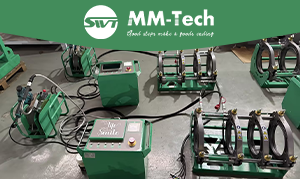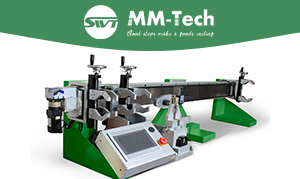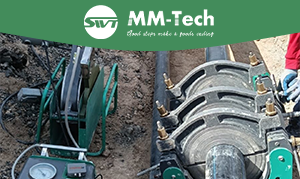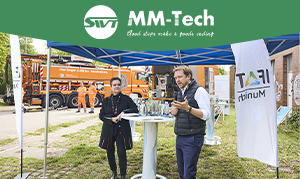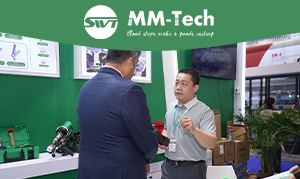Comparing MM-Tech ZDRJ-800 and OMISA HST 300 2.0 Welders
A detailed comparison of two leading electrofusion welding machines.
| Features | MM-Tech ZDRJ-800 | OMISA HST 300 2.0 |
|---|---|---|
| Welding Range | 20 mm to 800 mm pipes | Up to 1200 mm pipes |
| Supported Pipe Types | PE, PP, PPR pipes | PE, PP, PVDF pipes |
| Memory Capacity | Stores 4,000 welds | Stores 10,000 welds |
| Weight | 28 kg, portable | 16 kg, lightweight |
| Power Output | 4800 W, 120 A max current | 110 A max current |
| Data Transfer | USB and on-site printing | USB, Bluetooth, app support |
| IP Rating | IP54 dust and water resistance | Up to IP64 when closed |
| Warranty | 2 years warranty | 1 year warranty |
| Automation Features | Barcode scanning, temperature compensation | Weld monitoring, AutoWeld guidance |
| Certifications | Not specified | ISO 12176, DVS 2201-1, WEEE |
Professionals who want a fast and easy Electrofusion Welding Machine will notice the MM-Tech ZDRJ-800 is special. The main difference is its smart automation and exact control. This helps it weld faster and make fewer mistakes than the OMISA HST 300 2.0. People who want stronger joints, less manual work, and more work done should pick the MM-Tech ZDRJ-800. It has better welding speed, accuracy, and smart features.
Key Takeaways
-
The MM-Tech ZDRJ-800 is quick to set up. It uses smart automation. It changes welding for different temperatures. This makes welds strong and even.
-
The OMISA HST 300 2.0 can weld bigger pipes. It saves more weld records. This is good for big projects that need lots of data.
-
Both machines are simple to use and very strong. OMISA is lighter and easier to move. MM-Tech has a longer warranty. It also protects better from dust and water.
-
Data management is not the same. OMISA uses Bluetooth and saves up to 10,000 welds. MM-Tech uses USB and prints on-site. It can save 4,000 welds.
-
Pick MM-Tech for fast work, accuracy, and medium or large pipes. Pick OMISA if you need to move it, weld big pipes, and keep many records.
Comparison Table
Key Specs
| Specification | MM-Tech ZDRJ-800 | OMISA HST 300 2.0 |
|---|---|---|
| Welding Range | 20 mm – 800 mm | Up to 1200 mm |
| Supported Pipe Types | PE, PP, PPR | PE, PP, PVDF |
| Output Voltage | 8 – 48 V | 8 – 48 V |
| Max Output Current | 120 A | 110 A |
| Power Supply | 220 V, 50/60 Hz | 230 V, 50 Hz |
| Memory Capacity | 4,000 welds | 10,000 welds |
| Weight | 28 kg | 16 kg |
| Dimensions (mm) | 370 x 300 x 320 | Compact, portable |
| Operating Temp. Range | -10℃ to 40℃ | Not specified |
| IP Rating | IP54 | Not specified |
| Warranty | 2 years | Not specified |
| Certifications | Not specified | ISO 12176-2:2000, DVS 2201-1, WEEE |
Tip: Both machines work with many pipe types. They both have strong output. The OMISA HST 300 2.0 can weld bigger pipes. It also saves more welds in memory. The MM-Tech ZDRJ-800 is built tough and has a clear warranty.
Main Features
-
MM-Tech ZDRJ-800
-
It scans barcodes or lets you enter data by hand.
-
It keeps welds steady by adjusting for temperature.
-
The connector fits many kinds of pipes.
-
You can move data with USB or print on site.
-
The case is strong and keeps out dust and water.
-
You get help and training if you need it.
-
-
OMISA HST 300 2.0
-
It uses Bluetooth to send data easily.
-
It can save up to 10,000 welds by itself.
-
It follows ISO 12176 rules for tracking welds.
-
You can add a label printer and other tools.
-
It checks welds closely while working.
-
It is light and easy to carry.
-
Both machines have smart features for people who join pipes. The MM-Tech ZDRJ-800 is good at working in different places and does things automatically. The OMISA HST 300 2.0 is great for keeping track of welds and saving data, so it fits jobs that need lots of records.
Performance
Welding Capacity
Welding capacity means how big a pipe each machine can weld. It also shows how much power the machine uses. The MM-Tech ZDRJ-800 can weld pipes from 20 mm to 800 mm wide. It gives strong power at 4800 W and can reach 120 A current. The OMISA HST 300 2.0 can weld pipes up to 1200 mm wide. Its highest current is 110 A. Both machines use voltage between 8 and 48 V.
| Machine Model | Maximum Welding Diameter | Output Power | Output Voltage | Output Current |
|---|---|---|---|---|
| MM-Tech ZDRJ-800 | 800 mm | 4800 W | 8–48 V | 120 A |
| OMISA HST 300 2.0 | 1200 mm | N/A | 8–48 V | 110 A |
The OMISA HST 300 2.0 can weld bigger pipes. This makes it good for large building jobs. The MM-Tech ZDRJ-800 has more power. This helps make strong welds for medium and big pipes.
Speed
Speed matters for finishing work on time. The MM-Tech ZDRJ-800 uses smart controls and automation. It scans barcodes and adjusts for temperature by itself. This makes setup faster and welding quicker. Workers can scan or type in data. This helps them work faster and change things easily.
The OMISA HST 300 2.0 is also fast, especially with big pipes. It uses Bluetooth and saves data automatically. This helps workers keep records quickly. The MM-Tech ZDRJ-800 is special because it changes for temperature. This keeps welding smooth and steady.
Note: Fast welding means less waiting and more work done.
Precision
Precision means each weld is strong and safe. The MM-Tech ZDRJ-800 uses smart temperature controls. It changes how it welds based on the weather. This helps make welds that are always good. The machine can find errors early. This helps workers fix problems fast.
The OMISA HST 300 2.0 has a strong system to watch the welds. It checks voltage, current, and other things every time it welds. It also keeps track of repairs and saves each weld for records. This helps stop mistakes and makes sure welds are high quality.
Both machines have good precision features. The MM-Tech ZDRJ-800 uses smart controls and changes for the environment. The OMISA HST 300 2.0 watches welds closely and saves records. This is important for jobs that need careful checks.
Usability
Interface
Both machines are easy to use, but they work in different ways. The OMISA HST 300 2.0 has a bright screen with big letters. This makes it simple to read in any light. Workers can use a barcode scanner, type by hand, or use a special keyboard to add welding data. The machine lets you pick from many languages. It has a menu that helps you look at reports, find welds, and change things like units or buzzer sound. You can move data with USB or Bluetooth. This helps you send records fast.
The MM-Tech ZDRJ-800 also lets you scan barcodes or type in data. Its screen is made to be simple. You can scan barcodes or enter fusion numbers by hand. The machine gives clear steps and lets you move data with USB or print right there. This helps workers make fewer mistakes and finish welding faster.
Tip: Both machines help workers add and check welding data easily. OMISA has a better screen and more language choices.
Setup
Setting up both machines is easy. The MM-Tech ZDRJ-800 uses smart barcode scanning. This helps workers start jobs fast. You can also type in data if you want. The OMISA HST 300 2.0 works the same way. It has barcode scanning and manual entry. Its AutoWeld tool helps guide workers step by step.
Portability
Being easy to carry is important for field jobs. The OMISA HST 300 2.0 weighs 16 kg and is small. It fits in tight places and is simple to move. The MM-Tech ZDRJ-800 is heavier at 28 kg but still easy to take to most work sites.
| Machine Model | Weight | Dimensions (mm) |
|---|---|---|
| MM-Tech ZDRJ-800 | 28 kg | 370 x 300 x 320 |
| OMISA HST 300 2.0 | 16 kg | 236 x 295 x 330 |
Note: OMISA is lighter, so it is better for jobs where you move a lot.
Maintenance
Both machines are made to be simple to fix. The MM-Tech ZDRJ-800 has a strong case. It keeps out dust and water, so it breaks less. The OMISA HST 300 2.0 saves memory and has easy menus for fixing problems. This helps workers keep the Electrofusion Welding Machine working well.
Features
Control Systems
Both machines have smart controls to help workers make good welds. The MM-Tech ZDRJ-800 uses a barcode scanner. Workers can scan barcodes or type in data. The machine can save 4,000 welds in its memory. This helps workers check old welds when needed. The OMISA HST 300 2.0 also lets you scan barcodes. It saves up to 10,000 welds by itself. You can get the data in PDF, CSV, or DataWork files with a USB. The OMISA model follows ISO 12176 rules. This means every weld is saved and easy to find.
Both machines use barcode systems and big memory to help stop mistakes and make welds better.
| Model | Barcode System | Memory Capacity | Data Logging & Traceability |
|---|---|---|---|
| Optical scanner, manual input | 4,000 welds | USB transfer, on-site printing | |
| OMISA HST 300 2.0 | Barcode scanner, manual input | 10,000 welds | USB, Bluetooth, ISO 12176 compliance |
Safety
Safety keeps workers and machines safe. The MM-Tech ZDRJ-800 has a strong case. It keeps out dust and water. This helps the machine last longer and work in hard places. The OMISA HST 300 2.0 gives even more safety. It has an IP54 rating and can reach IP64 when closed. These ratings mean it keeps out dust and water very well. The OMISA model also meets many safety and environment rules like CE, DVS, RAEE, ISO 9001:2015, and RoHS.
Workers can trust both machines to be safe on many job sites, even when the weather is bad.
Connectivity
Connectivity helps workers share welding data easily. The MM-Tech ZDRJ-800 lets you use USB to move data to a laptop or printer. This makes it fast to check work and keep records. The OMISA HST 300 2.0 gives even more ways to share. You can use USB or Bluetooth to send data. The WeldTrace app works with Bluetooth, so you can share reports from the field. Both machines let you scan barcodes for quick data entry.
-
MM-Tech ZDRJ-800: USB data transfer, on-site printing, barcode scanning
-
OMISA HST 300 2.0: USB, Bluetooth, WeldTrace app, barcode scanning
Easy ways to connect help teams keep good records and finish projects right.
Reliability
Build Quality
Both machines are built strong. The MM-Tech ZDRJ-800 has a tough case. It keeps dust and water out. This helps the machine last longer. It works well in hard places. The OMISA HST 300 2.0 is also sturdy. When it is closed, it gets an IP64 rating. This means it blocks almost all dust and water. The table below shows the IP ratings for each model:
| Machine Model | IP Rating(s) |
|---|---|
| OMISA HST 300 2.0 (Print+) | IP64 (closed) |
| OMISA HST–S–315 2.0 | IP54 |
| MM-Tech ZDRJ-800 | Not mentioned (N/A) |
Note: Higher IP ratings mean better protection. OMISA HST 300 2.0 is great because it has IP64 when closed.
Warranty
Warranty helps buyers feel safe. The MM-Tech ZDRJ-800 gives a 24-month warranty. It covers free part replacement if something breaks during normal use. The OMISA HST 300 2.0 has a 12-month warranty from the maker. The table below compares the warranty terms:
| Machine Model | Warranty Duration |
|---|---|
| MM-Tech ZDRJ-800 | 24 months (covers free replacement of parts malfunctioning under normal use) |
| OMISA HST 300 Print+ 2.0 | 12 months manufacturer warranty |
Tip: Longer warranties can save money on repairs. They also show the company trusts their product.
Support
Support helps users fix problems fast. MM-Tech gives help before and after you buy. They train users and help with setup or fixing issues. OMISA also gives support and extra tools for field jobs. Both brands want their machines to work well and keep users happy.
Good support means less waiting and better work every time.
Value
Price
Price is important when picking an Electrofusion Welding Machine. People look at cost and features before buying. The MM-Tech ZDRJ-800 costs between $999 and $2,000. This price gives you smart automation and barcode scanning. It also has a big memory for weld cycles. The machine is made in China. It has features that help many professionals.
The OMISA HST 300 2.0 does not show a clear price for the Print+ 2.0 model. But the OMISA HST 300 Smart model costs about €1,053.33. This helps you guess the price for the 300 series. The Print+ 2.0 model probably costs more. It has better data tracking and Bluetooth.
| Product Model | Price Range (USD) | Origin | Key Features |
|---|---|---|---|
| MM-Tech ZDRJ-800 | 999 – 2,000 | China | Fully automatic, barcode scanner, 4000 cycles memory, USB data transfer |
| OMISA HST 300 Smart | ~1,150 | Italy | Professional control, Bluetooth, PDF transfer |
Buyers should ask local sellers for the newest prices and deals.
Ownership Cost
Ownership cost means more than just buying the machine. It includes fixing, support, and care over time. The MM-Tech ZDRJ-800 has a two-year warranty. This helps lower repair costs for two years. Its strong case keeps out dust and water. This means it breaks less often. MM-Tech gives help and training. This helps users avoid mistakes and keep the machine working.
The OMISA HST 300 2.0 has a one-year warranty from the maker. The machine is light and easy to move. This can make transport cheaper. OMISA gives support and extra tools like label printers and scanners. These extras can cost more but help with work and records.
-
MM-Tech ZDRJ-800: Lower repair costs with a longer warranty, strong build for fewer breakdowns, support and training included.
-
OMISA HST 300 2.0: Shorter warranty, lightweight for easy transport, optional accessories may add to cost.
A longer warranty and good support can help save money over time.
ROI
Return on investment (ROI) shows how much value you get from the Electrofusion Welding Machine. The MM-Tech ZDRJ-800 helps users work faster and make fewer mistakes. Its smart automation and temperature control make welds stronger. This means less fixing and redoing work. The machine saves up to 4,000 weld records. This makes it easy to check jobs and show quality. These features save time and money on every project.
The OMISA HST 300 2.0 can save up to 10,000 welds. It has Bluetooth and USB for easy record keeping. The machine works with big pipes. This is good for large projects. People who need lots of records and work on big sites may get more value from OMISA.
| Model | Warranty | Memory Capacity | Automation | Data Transfer | ROI Factors |
|---|---|---|---|---|---|
| MM-Tech ZDRJ-800 | 2 years | 4,000 welds | High | USB, Print | Fast setup, fewer errors, strong welds |
| OMISA HST 300 2.0 | 1 year | 10,000 welds | Medium | USB, Bluetooth | Large pipe support, traceability, easy records |
Picking the best machine depends on your project size, need for automation, and record keeping. Both models give good value for people who want speed, accuracy, and support.
Use Cases
MM-Tech ZDRJ-800 Applications
Many professionals pick the MM-Tech ZDRJ-800 because it works well in many jobs. This Electrofusion Welding Machine is good when you need fast, accurate, and flexible welding. Different industries use it for special reasons:
-
Construction: Workers use it to put pipes underground. It fits in small places like trenches.
-
Manufacturing: Teams like that it works with many pipe sizes and types. This helps them finish work faster.
-
Water and Gas Distribution: Operators trust it to make strong joints. These joints stop leaks in high-pressure pipes.
-
Agriculture: Farmers use it to build tough joints for irrigation outside.
-
Mining: Crews need its strong welds for pipes that move water and slurry in rough places.
The MM-Tech ZDRJ-800 is great for jobs that need to find mistakes, work in different weather, and keep welds strong every time.
OMISA HST 300 2.0 Applications
The OMISA HST 300 2.0 is best for jobs that need smart welding controls and good record keeping. Makers say it works well for many plastic pipe jobs. It can weld big fittings up to 1200 mm wide. This makes it good for big projects. The HST–S–315 2.0 model is made for PE fittings from 16 to 315 mm. This is just right for wastewater and roof drainage jobs. Its temperature control, weld checks, and easy carrying make it good for field work.
Project managers choose the OMISA HST 300 2.0 for:
-
Wastewater systems
-
Roof drainage jobs
-
Upgrading sanitary systems
-
Geothermal and heating jobs with big pipes
OMISA HST 300 2.0 gives steady work and keeps records for jobs that need careful checks and proof of quality.
| Application Area | MM-Tech ZDRJ-800 | OMISA HST 300 2.0 |
|---|---|---|
| Construction | ✔️ | ✔️ |
| Water/Gas Distribution | ✔️ | ✔️ |
| Agriculture | ✔️ |
|
| Mining | ✔️ |
|
| Wastewater |
| ✔️ |
| Roof Drainage |
| ✔️ |
| Sanitary Systems |
| ✔️ |
| Geothermal/Heating |
| ✔️ |
Both machines help with pipe jobs. Each one is better for certain industries and project sizes.
Picking the best Electrofusion Welding Machine depends on your project. The MM-Tech ZDRJ-800 is good if you want quick setup and strong welds. It also helps you handle data easily for medium or big pipe jobs. The OMISA HST 300 2.0 is light and can weld pipes up to 1200 mm. It has smart tools to watch the welding process. Many people like OMISA because it is small and easy to carry. It has pro controls and keeps good records. Before you choose, think about pipe size, how you track data, and if you need to move the machine a lot.
FAQ
What is the biggest difference between the MM-Tech ZDRJ-800 and OMISA HST 300 2.0?
The MM-Tech ZDRJ-800 offers advanced automation and temperature compensation. The OMISA HST 300 2.0 provides larger pipe welding capacity and more memory for weld records. Each machine targets different project needs.
Which machine is easier to carry to job sites?
The OMISA HST 300 2.0 weighs only 16 kg. The MM-Tech ZDRJ-800 weighs 28 kg. Workers who move equipment often may prefer the lighter OMISA model.
Which model offers better data management features?
The OMISA HST 300 2.0 supports Bluetooth, USB, and stores up to 10,000 welds. The MM-Tech ZDRJ-800 uses USB and on-site printing, with a 4,000-weld memory. OMISA provides more options for large projects needing detailed records.
Which machine is better for outdoor or harsh environments?
Both machines have strong cases and good protection. The OMISA HST 300 2.0 reaches IP64 when closed. The MM-Tech ZDRJ-800 has an IP54 rating. Both work well outdoors, but OMISA offers slightly higher dust and water resistance.
Who should choose the MM-Tech ZDRJ-800 over the OMISA HST 300 2.0?
Professionals who need fast setup, smart automation, and strong welds for medium to large pipes should choose the MM-Tech ZDRJ-800. It suits jobs where speed, accuracy, and flexible operation matter most.


